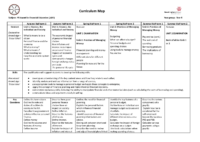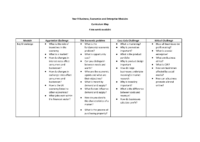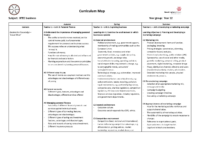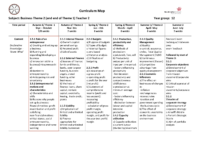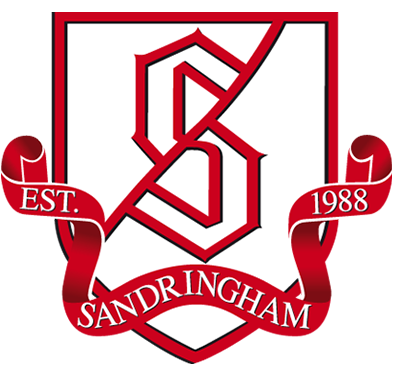Economics, Business and Enterprise
The Economics, Business and Enterprise faculty offers a variety of qualifications at Sandringham School, from Year 9 to Year 13.
The faculty comprises:
- Rachel Harding – Director of Learning
- Marvin Brown – Assistant Director of Learning
- Katie Cave – Teacher
- Dr. Caroline Creaby – Deputy Headteacher (Maternity leave)
- Vikki Borman – Teacher
- Victoria Sage – Teacher
- Victoria Opie – Teacher
- Adam Rowley – Teacher
Key Stage 3
In Year 9, students get their first experience of the faculty through a choice of two modules: the Enterprise Module and the LIBF Award in Financial Education.
Enterprise Module
We offer four 9 week rotations throughout the year where students learn about basic principles of business and enterprise, and work in teams on a variety of challenges:
- Autumn: The Apprentice Challenge
- Winter: The Economic Problem
- Spring: The Coca Cola Challenge
- Summer: The Ethical Challenge
Award in Financial Education (LIBF)
We offer the London Institute for Banking and Finance Level 2 qualification (worth equivalent of half a GCSE) within the Year 9 modules. To complete this, students have to take Financial Education for all 4 rotations as the qualification spans the whole year. Students study the following two units and they are assessed in an online examination in January and June of Year 9:
- Unit 1: Finance, the Individual and Society
- Unit 2: Practices of Managing Money
Key Stage 4
In Years 10 and 11, students can take either GCSE Business or GCSE Economics.
GCSE Business
What is GCSE Business?
On this course you will find out how businesses start up, grow and manage their day-to-day affairs. The course examines how businesses operate in the global economy. The course focuses on the key areas of business, such as; marketing, finance, operations and human resource management, and investigates how businesses are affected by their external environment. As part of the course, you will also learn a variety of ways to analyse and evaluate real situations and, therefore, make recommendations based on business strategy.
What topics will I cover?
Theme 1: Investigating Small Business (Year 10):
- Enterprise and entrepreneurship
- Spotting a business opportunity
- Putting a business idea into practice
- Making the business effective
- Understanding external influences on business
Theme 2: Building a Business (Year 11)
- Growing the business
- Making marketing decisions
- Making operational decisions
- Making financial decisions
- Making human resource decisions
You will learn about types of ownership, why businesses conduct market research and how they apply a marketing mix to attract their customers. You will consider why they analyse the market. You will also reflect on the skills and attributes of entrepreneurs, the main forms of businessownership and legal issues. You will study how businesses manage their finance and the sources of finance available to them. Simple economic concepts are introduced. You will gain an insight into how large businesses are run successfully and why they fail. Throughout the course, you will make links across the different areas of business to consider, for example, the implications for finance of launching a marketing campaign on a national scale. As part of this course you will have the opportunity to take part in the Tycoon in Schools Programme and in doing so you will get hands on experience of the world of Business.
How am I assessed?
You will be assessed through two external examinations, each lasting 90 minutes and worth 50% of the overall qualification. The papers assess your knowledge, and ability to apply, analyse and evaluate problems in a specific business context using a mix of multiple choice questions, calculations, short answer questions, case study questions and extended responses.
Paper 1 covers: Theme 1 – Investigating small business
Paper 2 covers: Theme 2 – Building a business
What examination board will I follow?
Edexcel
Who should I speak to for further information?
Mrs Harding, Mrs Cave or Mr Brown
GCSE Economics
What is GCSE Economics?
On this course you will find out how individuals and firms operate in the UK and global economy. You will study how recent events such as BREXIT may impact the UK and Europe and understand the role of the political environment in which we exist.
What topics will I cover?
The course is split into two elements consisting of Microeconomics and Macroeconomics.
The break down can be seen below:
Microeconomics:
- Introduction to Economics
- How prices are determined
- Production, costs, revenue and profit
- Competition in markets
- The role of money and financial markets
Macroeconomics:
- Government objectives
- How the government manages the economy
- Limitations of markets
- International trade and the global economy
You will gain an insight into what is happening in the current economic climate and strategies the government can use to influence the economy. You will study supply and demand and consider how to achieve sustainable growth in developing nations. There may be an opportunity for you to take part in the Tycoon in Schools programme, and in doing so gain a deeper understanding of business decision making.
What examination board will I follow?
OCR
Who should I speak to for further information?
Mrs Harding, Mrs Sage or Mr Brown
Key Stage 5
In Years 12 and 13, students can take one of the following: GCE Economics, GCE Business, or BTEC Business L3. In addition, students can take a L3 Certificate in Financial Studies in Year 12.
GCE Economics
Course Aims
In this course you will be required to think like an economist and carefully weigh up the costs versus the benefits of many decisions. You will look at models and learn to think logically. You will need good written and oral communication skills. Strong mathematical skills are also required.
In Year 12 students will be introduced to Micro- and Macro-economics. Micro-economics seeks to explain how firms and individuals make choices in a world with scarce resources. You will become familiar with some basic economic models such as supply and demand. Macro-economics seeks to explain trends in the wider economy and how the government can influence these trends. You will be assessed through examinations which require multiple-choice plus a justification of your answer, data-response questions, and open-ended essay questions.
Course Structure
Examination Board: Edexcel https://qualifications.pearson.com/en/qualifications/edexcel-a-levels/economics-a-2015.html
A Level
Paper 1: Markets and business behaviour – Exam: 35% – 2 hrs
Paper 2: The national and global economy – Exam: 35% – 2 hrs
Paper 3: Microeconomics and macroeconomics – Exam: 30% – 2 hrs
Theme 1: Introduction to markets and market failure
This theme focuses on microeconomic concepts. Students will develop an understanding of:
- nature of economics
- how markets work
- market failure
- government intervention
Theme 2: The UK economy —performance and policies
This theme focuses on macroeconomic concepts. Students will develop an understanding of:
- measures of economic performance
- aggregate demand
- aggregate supply
- national Income
- economic growth
- macroeconomic objectives and policy.
Theme 3: Business behaviour and the labour market
This theme develops the microeconomic concepts Introduced in Theme 1 and focuses on business economics. Students will develop an understanding of:
- business growth business objectives
- revenues, costs and profits
- market structures
- labour market
- government intervention.
Theme 4: A global perspective
This theme develops the macroeconomic concepts introduced in Theme 2 and applies these concepts in a global context. Students will develop an understanding of:
- International economics poverty and inequality
- emerging and developing economies
- the financial sector
- role of the state In the macroeconomy.
Future Pathways
Students go on to study such a wide variety of related subject such as: Accountancy, International Business, Retail Management and Politics. Hopefully some students will become the successful entrepreneurs and world leaders of the future!
GCE Business
Course Aims:
Students are introduced to business through building knowledge of core business concepts and applying them to business contexts to develop a broad understanding of how businesses work. Breadth and depth of knowledge and understanding, with applications to a wider range of contexts and more complex business information, are developed in the second year, requiring students to take a more strategic view of business strategies and issues.
Course Structure
Edexcel – https://qualifications.pearson.com/en/qualifications/edexcel-a-levels/business-2015.html
At the end of year thirteen students will sit three papers, broken down as follows:
A Level
Paper 1: Marketing, people, and global businesses – Exam: 35% – 2 hrs
Paper 2: Business activities, decisions, and strategy – Exam: 35% – 2 hrs
Paper 3: Investigating businesses in a competitive environment – Exam: 30% – 2 hrs
The course is split into a number of themes. Themes 1 and 2 are studied in year 12, while Themes 3 and 4 are studied in year 13.
Theme 1 and 4 will be assessed in paper 1. Theme 2 and 3 will be assessed in paper 2, and paper 3 is a combination of all themes based on a pre-release case study.
Theme 1: Marketing and people
Students will develop an understanding of:
- meeting customer needs
- the market
- marketing mix and strategy
- managing people
- entrepreneurs and leaders.
Theme 2: Managing business activities
Students will develop an understanding of:
- raising finance
- financial planning
- managing finance
- resource management
- external influences.
Theme 3: Business decisions and strategy
This theme develops the concepts introduced in Theme 2. Students will develop an understanding of:
- business objectives and strategy
- business growth
- decision-making techniques
- influences on business decisions
- assessing competitiveness
- managing change.
Theme 4: Global business
This theme develops the concepts introduced in Theme 1. Students will develop an understanding of:
- globalisation
- global markets and business expansion
- global marketing
- global industries and companies (multinational corporations).
Future Pathways
Students go on to study such a wide variety of related subject such as: Accountancy, International Business, Retail Management and Politics. Hopefully some students will become the successful entrepreneurs and world leaders of the future!
BTEC Business: BTEC Level 3 National Extended Certificate in Business
Course Aims:
The BTEC Level 3 National Extended Certificate in Business broadens knowledge focus from the BTEC Enterprise Level 2 qualification. There is potential for the qualification to prepare learners for employment in the appropriate vocational sector and it is suitable for those who have decided that they wish to enter a particular area of work. It is the equivalent of one A Level.
Qualifications and Qualities Needed
Students must achieve GCSE grades ‘5’ in English Language and Mathematics or a ‘Merit’ grade in BTEC Level 2Enterprise. You must be an independent learner and able to meet deadlines.
Course Structure
Edexcel – https://qualifications.pearson.com/en/qualifications/btec-nationals/business-2016.html
The course is divided into internally assessed units and externally assessed units. Internally assessed units will be assessed, via students completing coursework assignments. The assignments will use a variety of assessment methods, such as writing reports, delivering presentations, or demonstrating skills within a group. In accordance with Exam board regulations, students will be given one resubmission opportunity to achieve the Pass, Merit or Distinction criteria, so they must complete their work on time, to a high standard.
Units studied
- Exploring Business (internally assessed)
- Developing a Marketing Campaign (externally assessed)
- Personal and Business Finance (externally assessed)
- Investigating Customer Service (internally assessed)
Future Pathways:
Students go on to study such a wide variety of related subject such as: Accountancy, International Business, Retail Management and Marketing. Hopefully some students will become the successful entrepreneurs of the future!
Enterprise
Furthermore, we aim to offer enterprise opportunities to students across the school:
KS4: Tycoon in Schools
KS5: Young Enterprise
Certificate in Financial Studies
- A route to higher education
- A career in financial services
- UCAS tariff of 60 points at grade A

Course Aims
The qualification will enable students to make informed and confident decisions regarding their finances. It will help students to become responsible borrowers, sensible savers and have an appreciation of the need for financial planning throughout their life. It is designed to encourage students to be inspired to meet their lifetime aspirations.
Qualifications and Qualities Needed.
Students are expected to be self-motivated and be interested in the financial world. Wider reading from appropriate websites and the personal finance section from newspapers is expected. Students receive a set of course notes and they will be expected to keep up with the required reading as well as consult the LIBF website for further relevant materials.
Course Structure
The course is divided into three units and each unit will focus on a different aspect of finance.
Unit 1: Financial management in the short term
Unit 2: Financial management in the medium to long term
The course is designed to teach students how to apply appropriate solution(s) from the wide range available within the evolving financial services marketplace. The course provides financial literacy and life skills which is appropriate for students wishing to pursue a career in finance, or simply wishes to understand how to manage their finance better.
Assessment
There are four exam papers:
Unit 1 Part A: 35 multiple choice questions (25%)
Unit 1 Part B: small mark and essay questions based on a pre-released case study (25%)
Unit 2 Part A: 35 multiple choice questions (25%)
Unit 2 Part B: small mark and essay questions based on a pre-released case study (25%)
Future pathways
This qualification is the equivalent to AS and worth 28 UCAS points at grade A*). It is possible to study finance to degree level. This qualification acts as a great springboard to future careers in business, finance, managerial and economics. It complements any university applications for courses in these areas.
Enterprise
Furthermore, we aim to offer enterprise opportunities to students across the school :
KS4 : Tycoon in Schools
KS5 : Young Enterprise
At KS4 the enterprise opportunities are integrated within the curriculum, whilst Young Enterprise is open to any student in the Sixth Form.
Beyond Sandringham
Finally, there is keen focus on providing our students with the passion and understanding and skills to study Economics, Business and Enterprise relates courses at college or university or pursue related careers.
Key Stage 3 Curriculum Maps
Key Stage 4 Curriculum Maps
Key Stage 5 Curriculum Maps
To access the Super Curriculum for this subject please visit the Super Curriculum page HERESuper Curriculum



